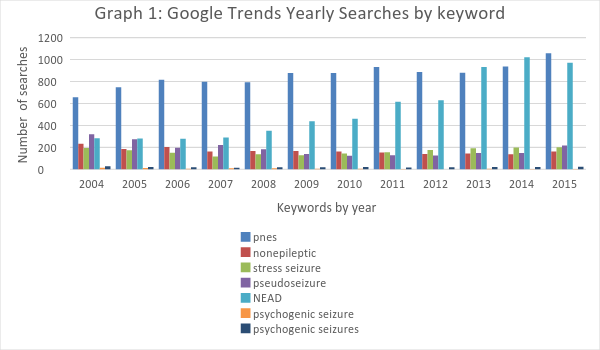
Posters
2016
(Abst. 2.321), 2016
PSYCHOGENIC NON-EPILEPTIC SEIZURES (PNES) ON THE INTERNET: ON-LINE REPRESENTATION AND FREQUENCY OF SEARCH TERMS
Authors: L. Myers, J. Jones, N. Boesten, M. Lancman
Rationale: There are too few professionals who have an adequate understanding of PNES and are therefore not always prepared to educate their patients about their diagnosis and treatment recommendations. Therefore, in the age of the internet, it is not surprising that patients or caretakers might look for answers on-line. The purpose of this project was to investigate the representation of PNES and its associated terms on-line.
Methods: In order to determine on-line representation of PNES, we conducted three separate searches: 1) Google® , 2) Twitter® and 3) YouTube® for the following terms: "pnes", "pseudoseizure", "nonepileptic", "stress seizure", "dissociative seizure", "nonepileptic attack disorder", "NEAD", "psychogenic seizure" and "psychogenic seizures". All websites that appeared on the first three pages of Google® and YouTube® were recorded. As for Twitter®, the first 60 tweets were recorded. From that point, we separated the websites and YouTube videos into categories: 1) professionally-hosted, 2) patient/activist hosted, and 3) dually-hosted (professional and patient/activist). On Twitter®, the tweeters chosen name or hashtag handles that follow the tweet along with the content of the tweet was used to produce a rough classification of whether the writer was a professional or a layperson.
Results: A search using all the terms described in Methods revealed 80 professionally-hosted sites and 56 patient/ advocate sites. We identified three sites that fell within the combined patient/activist and professionally-hosted category. Professionals tended to use traditional hosting options while patients used many of the newer and non-traditional options.A total of 360 tweets that clearly referred to PNES and its associated terms were identified. Non-professionals tended to tweet more with the handle : "dissociative seizures," "non-epileptic attack disorder," and "stress seizure." Professionals tweeted more with the handle "psychogenic seizures." Tweets with the keyword "pseudoseizures" had a tendency to be pejorative.We identified 71 videos and 13 channels on YouTube® (a video sharing on-line site) that referred to PNES. Twenty two videos were professionally produced and 49 were produced by patients or advocates. PNES and NEAD were the most commonly searched keywords with "pseudoseizures" in the third place.
Conclusions: PNES is clearly represented on-line in several mediums including Google pages, Twitter, and YouTube. There are professionally and patient/advocate hosted options in all three mediums. Professionals might benefit from using some of the newer and non-traditional hosting options and increasing the number of on-line materials for health professionals.. A detailed examination, in particular, of the quality of patient produced on-line content is needed.
Funding: This project received no funding.
Figures:

<